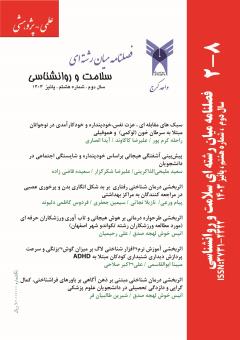اثربخشی درمان شناختی مبتنی بر ذهن آگاهی بر باورهای فراشناختی، کمال گرایی و دلزدگی تحصیلی در دانشجویان علوم پزشکی انیس خوش لهجه صدق / شیرین طالبیان فر
محورهای موضوعی : علوم سلامت و روانشناسی
1 -
کلید واژه: واژه های کلیدی: درمان شناختی مبتنی بر ذهن آگاهی, باور های فراشناختی, کمال گرایی و دلزدگی تحصیلی. ,
چکیده مقاله :
چکیده هدف ازاجرای این پژوهش بررسی اثربخشی درمان شناختی مبتنی بر ذهن آگاهی بر باورهای فراشناختی، کمال گرایی و دلزدگی تحصیلی در دانشجویان علوم پزشکی بود. پژوهش از نظر نوع هدف، یک پژوهش کاربردی و از نظر نوع روش، یک مطالعه آزمایشی با طرح پیش آزمون-پس آزمون با گروه کنترل است. جامعه آماری این پژوهش شامل کلیه دانشجویان دانشگاه علوم پزشکی قم به تعداد 1300 نفر در سال 1403 بود که تعداد 30 نفر به عنوان حجم نمونه از طریق نمونهگیری در دسترس انتخاب شدند و در دو گروه آزمایش و کنترل جایگزین شدند. ابزار گردآوری داده ها پرسشنامه باورهای فراشناختی ولز، کمال گرایی هویت و فلت، بی حوصلگی تحصیلی خوش لهجه و سرکشیکیان بوده است. داده¬ها با استفاده از نرمافزارهای آماری SPSS26 مورد تجزیه وتحلیل قرارگرفتند. یافته های پژوهش نشان داد که درمان شناختی مبتنی بر ذهن آگاهی بر باورهای فراشناختی، کمال گرایی و دلزدگی تحصیلی در دانشجویان دانشگاه علوم پزشکی اثرگذار است (p>0.05) نتیجه گیری می شود که با استفاده از درمان شناختی مبتنی بر ذهن آگاهی می توان باورهای فراشناختی وکمال گرایی را تقویت کرده و دلزدگی تحصیلی دانشجویان دانشگاه علوم پزشکی را کاهش داد. واژه های کلیدی: درمان شناختی مبتنی بر ذهن آگاهی، باور های فراشناختی، کمال گرایی و دلزدگی تحصیلی.
Abstract The aim of this study was to investigate the effectiveness of mindfulness-based cognitive therapy on metacognitive beliefs, perfectionism, and academic burnout in medical students. The study is an applied research in terms of its purpose and an experimental study with a pre-test-post-test design with a control group in terms of its method. The statistical population of this study included all 1300 students of Qom University of Medical Sciences in 2014, of which 30 were selected as the sample size through convenience sampling and were divided into two experimental and control groups. The data collection tools were Wells's Metacognitive Beliefs Questionnaire, Identity and Felt's Perfectionism, and Academic Boredom and Rebelliousness. The data were analyzed using SPSS26 statistical software. The findings of the study showed that mindfulness-based cognitive therapy is effective on metacognitive beliefs, perfectionism, and academic burnout in students of the University of Medical Sciences (p>0.05). It is concluded that using mindfulness-based cognitive therapy can strengthen metacognitive beliefs and perfectionism and reduce academic burnout in students of the University of Medical Sciences.
منابع
بنیسی، پریناز. (1402). اثربخشی آموزش مدیریت استرس مبتنی بر ذهنآگاهی بر انگیزش پیشرفت و رضایت آموزشی از دانشگاه در دانشجویان پزشکی.
حسین زاده، قادر. (1402). نقش باورهای فراشناختی و کمال گرایی (مثبت و منفی ) در پیش بینی بهزیستی تحصیلی در دانش آموزان پسر مقطع متوسطه اول شهر مهاباد. مقاله کنفرانسی سی وی لیکا.
دلاورپور، محمداقا و حسین چاری، مسعود. (1397). تبیین دلزدگی تحصیلی دانش آموزان با توجه به ادراک از محیط یادگیری و میانجی گری ارزش تکلیف. مجله مطالعات آموزش و یادگیری.
دهقان منشادی، منصور، دیبازر، سارا، حیدری، یاسر، کلانترزاده، فهیمه. (1400). اثربخشی درمان شناختی مبتنی بر ذهن آگاهی بر کاهش استرس و کمال گرایی دانش آموزان دختر مدارس نمونه دولتی دوره دوم متوسطه شهر یزد. ماهنامه علمی پژوهشی دانشکده بهداشت یزد.
موسوی، خدیجه، حیدری، شعبان، عمادیان، سیده علیا. (1402). اثربخشي آموزش ذهن آگاهي بر خردمندي و پایستگی تحصیلی دانشجویان دختر دانشگاه فرهنگیان آمل. فصل نامه پژوهش های برنامه ریزی درسی و آموزشی.
نصیرزاده، سمیه و نرگسیان، جواد. (1398). بررسی تاثیر باورهای فراشناختی بر بهزیستی تحصیلی با میانجی گری کمال گرایی دانش آموزان. مجله روانشناسی مدرسه.
Adam W. Hanley, Michael de Vibe, Ida Solhaug, Kwynn Gonzalez-Pons, Eric L. Garland. (2022). Mindfulness training reduces neuroticism over a 6-year longitudinal randomized control trial in Norwegian medical and psychology students. Journal of Research in Personality, Volume 82, October 2019, Article 103859
Kabat _ zinn, J . (2005). Full catastrophe living: using the wisdom of your body and mind to face stress, pain, and illness
Kabat-Zinn, J. (2013) Mindfulness-Based Interventions in Context: Past, Present and Future. Clinical Psychology: Science and Practice.V 10, 144-156
Pekrun, R, Goetz, T, Daniels, L. M., Stupnsky, R.H., & Perry, R.P.(2004). Boredom in achievement settings: exploring controlevalue antecedents and performance outcomes of a neglected emotion.
Stober, J., Kempe, T., & Keogh, E. J. (2008). Facts of self-oriented and socially prescribed perfectionism and feelings of pride, shame, and guilt following success and failure.
Terry-Short, L. A., Ownes, R. G., Slade, P. D., & Dewey, M. E.(1995). Positive and negative perctionism to academic adjustment.
Vogel-Walcutt, J . J. Fiorella, L., Carper, T., & Schatz, S. (2012). The Definition,
Zhang, Y., Rosen, S. & Chen, M. (2020). Students’ perception of classroom environment in China and its relationship to creativity of students who have visual impairments. J Dev Phys Disabil, 21 (2): 16-25.
Claus, N., Miegel, F., Jelinek, L., Landmann, S., Moritz, S., Külz, A. K., ... & Cludius, B. (2023). Perfectionism as possible predictor for treatment success in Mindfulness-Based Cognitive Therapy and Metacognitive Training as third-wave treatments for obsessive-compulsive disorder. Cognitive Therapy and Research, 47(3), 439-453.

